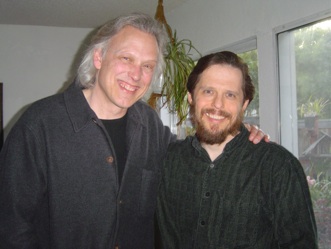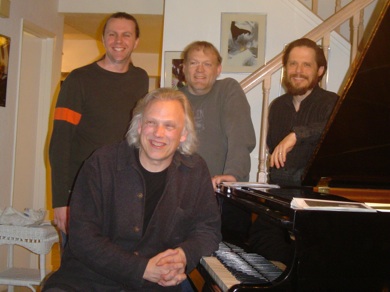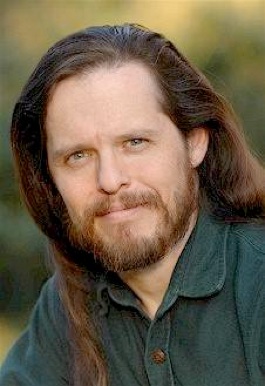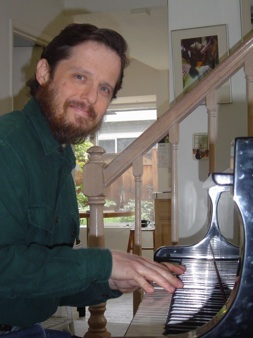Jeff Bjorck was one of the five composers who came to be with us for David Lanz’ workshop last month. I reviewed Jeff’s first album, “Pure Piano Portraits” for “Wind and Wire” magazine, and emailed him to tell him how much I enjoyed his work. We have been online pals ever since, and when we met in person for the first time on October 5 (2001), we felt we already knew each other quite well. Jeff’s second CD, “Pure Piano Panoramas” was on my “Top 10 for 2000” - both albums are among my favorites. Jeff has generously donated several copies of both CDs to be given away at the December recital. I’m not sure how we’ll do it yet, but will keep you posted.
Here is Jeff’s story so far:
Jeffrey Bjorck was born on November 17, 1960, in Hackensack, New Jersey. His parents were both artists who met while attending commercial art school. His mom, Irene, worked for Norcross Greeting cards and painted watercolors of the “Norcross Rose” (Norcross was as popular as Hallmark at the time). She is now retired, but worked at various jobs over the years, focusing mostly on making and selling crafts and artwork. “She can make anything out of anything!” Jeff’s dad, Walter, Jr., worked as an artist, drawing and painting advertisements, book jackets and magazine covers, etc.. He was also the main artist for the American Tract Society from 1959 to the mid 1960s. Next, he worked with Walter Martin, who founded Christian Research Institute, an organization that produced literature regarding religious issues. “My father was a bit of a Renaissance man too. While he worked as a freelance artist and also worked for CRI, he got involved in Christian talk radio in the mid-1960s. He hosted call-in programs on a variety of Christian stations for 20 years. The format of the programs would entail listeners calling in with questions about the Bible, or cults, or current issues in the context of faith, etc.” Walter died in 1991, shortly after Jeff and his wife, Sharon, moved to California. Jeff has an older brother named Walter III and a younger sister named Ellen. All three kids took piano lessons from their mother for several years, but Jeff is the only one who still plays. Ellen sings solos for church.
The Bjorck family moved from Hackensack, New Jersey to Hamburg, NJ in January of 1963. Jeff lived in that house (where his mom still lives) until he left for college at Colgate University in New York (where he earned his BA in Psychology). Later on, he lived at home for a year and then moved to The University of Delaware for graduate school (where he earned an MA and PhD in Psychology). He met his wife, Sharon, there. After that, he moved to Oklahoma City, OK for his year of internship, and then back to Delaware to finish his dissertation. “ Sharon and I moved to CA so that I could start my first job as a psychologist, while the ink was still drying on my diploma. I came to work at Fuller Seminary’s Graduate School of Psychology as a psychology professor in November of 1990.” They just bought their first house and are now living in Monrovia, CA.
Jeff took piano lessons from his mother from the ages of nine to thirteen. “When I stopped lessons, I had mastered the first movement of Moonlight Sonata and a few other classical pieces, but I could not sight read because I never lost the bad habit of looking down. My mother did not realize at the time that I had a photographic memory, so I would quickly memorize the music and then look away from it to play. Today, I don’t have to look at the keys much when I play, but unfortunately, I still can’t sight read.” His mom insisted that Jeff not improvise when he was practicing his lessons, and he started composing at about the same time as he stopped taking lessons. There is an interesting story behind Jeff’s improvising at the piano. “I had been doing a ’push-up’ contest with my dad, and I did 65. Then, I noticed that I had a weird strain, which turned out to be a hernia. The doctor said, ’no gym class, lifting, clarinet blowing, or any straining.’ As a hyperactive kid, this about drove me crazy! There was nothing to do but sit at the piano and fool around. But this ’fooling around’ led me to discover that I could improvise and figure out songs on the radio, etc., and also compose my own music. After that, I played the piano constantly, all the way through my high school years. I think Mom’s piano lessons were one of the greatest gifts she ever gave me.” Jeff wrote his first song at nine, and his first piano compositions when he was thirteen. He played two of these at a band concert in eighth grade. He was approached after the concert by a professor from Julliard School of Music, who encouraged Jeff to apply there after high school. He did not.

Jeff and David Lanz in Hercules, CA
Jeff also played the clarinet from grades 4-10. “I won several scholarship competitions based on recital performances, and the scholarships would always pay for more lessons. Interestingly, I could sight-read clarinet music. My clarinet teacher strongly discouraged me from improvising, which I also loved to do on the clarinet. I confess that I did not take his advice. I loved to improvise and play along with my dad’s Big Band records (e.g., Benny Goodman, Artie Shaw). In my first year of high school, I joined the marching band, but I abandoned the clarinet after a year in favor of the triple drums, which I played for another year. I really enjoy percussion! I still played clarinet in the high school concert band, but I quit this, too, after my sophomore year because the band at my school was more of a ’partying group’ rather than serious musicians. Besides, I concentrated my musical energy on a jazz band, in which I played piano. This jazz band ran through my freshman, sophomore, and junior years. During my sophomore year, I was given an award for ’outstanding musician’ (along with a number of other musicians from other schools) at a NJ state jazz band festival/competition.”
KP: Did you ever consider being a musician only?
Bjorck: Almost never. This is one reason that I did not pursue formal lessons in high school. Even in my early teens, I knew that I did not want to be a full-time composer. Rather, I wanted to work more directly with helping people. Another reason that I did not pursue music as a career was that, for me, playing at the piano was--and is--a very special and wonderful emotional release. I always feared that “going pro” would turn this special recreational activity into “just work” and I did not want to risk this. Today, I am still glad for this choice, because I found that even the process of recording one CD turned music much more into “work” than “play.” I really admire full-time professional musicians, but I don’t think I was cut out to be one.
KP: Have you always been a “Renaissance” person?
Bjorck: Yes! When I was a little boy, I was already frustratedly aware that there just wasn’t enough time in life to pursue all the interests I had. I told my folks (tongue in cheek) that my hobby was collecting hobbies. My father always said I should have been five people due to my multiple interests.
KP: Did being a hyperactive child make growing up more difficult?
Bjorck: YES!!! It was very hard to just sit still (and it still is! If you looked over your shoulder during the David Lanz workshop, you might have noticed that I stood in the kitchen and walked around occasionally!) Piano was always a great energy outlet, and my compositions earlier in life were a lot more energetic! When I was 11, though, I found a way to focus my energy on being still. I developed a love for wild birds, and I wanted more than anything to be able to have them fly to my hand and let me feed them. Birds are very skittish, of course, so this required me to stand out in the snow, stock still for hours, moving only an inch every 1/4 hour or so. Well, the
double good news is that I succeeded in getting right up to the birds, and I succeeded in learning how to “energetically pursue stillness.”
KP: Who or what are your biggest musical influences?
Bjorck: I would have to start with my parents! My mother, obviously, because she was my teacher and I think teachers have the most profound influence on their students. My father, because he loved to listen to music and had an extensive record (yes, even 78s) collection of big band, orchestral, classical, and opera music. There was always music playing in my home, and my father’s love of big band jazz was the strongest factor in instilling my love of improvisation. After my parents, I must confess that I never really tried to imitate anyone. I was playing “new age” piano before I had ever heard anyone else play it. Classically, I am not very literate, but I love Beethoven, Chopin, Debussy, and Brahms among others. I think these composers were particularly adept at expressing emotion with their music, which is something I have definitely focused on.
KP: Has your music been used for films and/or TV?
Bjorck: Films, yes. TV....not yet, although all my music is part of a commercial music library owned by every major studio in Hollywood. So time will tell! My music has been used in videos, commercials, and various films (but nothing like a major motion picture).
KP: What are some of the jobs you’ve had?
Bjorck: My first full-time professional job is the one I still have...as a clinical psychologist and professor at a graduate school, where I teach future clinical psychologists working for their doctoral degrees. As for part-time jobs, that’s another story! I have done everything from gardening, handyman work, dishwashing, restaurant and institutional cooking, and working as a nursing assistant in a psychiatric hospital.
KP: How do you see your musical future shaping up?
Bjorck: I hope to continue composing and recording, perhaps producing a new CD every 2 or 3 years. At this point, I am so grateful to those who have expressed appreciation for my music and purchased it from my website and elsewhere. They not only affirm my desire to be heard, but they make this all possible! I will most likely never approach music as a “full-time” endeavor or “day job,” and so I am very grateful for those who allow me to experience the joys of being a “recording artist” rather than simply a “closet musician.”
KP: What has been your most exciting musical moment or experience so far?
Bjorck: No one experience clearly stands out, but I would actually need to rate my weekend in Hercules as one of the most wonderful musical experiences I have had. Starting with David Lanz’ concert Saturday night, then getting to see all your students perform David’s musi in front of him (they don’t know how lucky they are!), and then capping it off when a number of us who are composers played for each other later that evening. What a weekend! I will long remember it!
KP: You have said that you are doing too many things to focus on music only. What are some of those other things?
Bjorck: Well, I am a clinical psychologist with a private practice. I am a professor who teaches full time. I am a researcher who conducts research and writes scientific articles published in research journals (part of my professor job). I have written a professional book for those in mental health. I am an avid hang glider pilot. I lift weights and have participated in competitive power lifting competitions. I do step aerobics twice a week with my wife Sharon (who is the volunteer instructor when she is not working as a professor herself). I love photography, gardening and landscaping, hiking with Sharon and occasionally camping, travelling (often to national parks or other locations where we can hike, camp, and go hunting for wildlife (with my camera). I am also active in my church, where I preach occasionally and teach occasionally as well. And....If I had more time (!) I would love to spend more time on some of my other interests, like drawing, painting, sculpture, poetry, snorkeling/skin-diving, carpentry, and collecting things stamps, coins, rocks/minerals, baseball cards from the turn of the century. Does that give you an idea? I could go on if you like!
KP: How do you go about writing a piece of music?
Bjorck: I typically just sit at the piano and play spontaneously from my heart, with a tape recorder going to catch any particular themes that strike me. Then I return and work on these themes, developing them more fully. My compositions, however, are rarely, if ever, “exactly” finished note for note. Thus, I play even “finished” works slightly differently every time. One of the challenges of recording is that I feel I have to “trap” a piece in a more “unchanging” format to record it. Fortunately, I am still able to keep many pieces more spontaneous and even my recorded pieces are seldom played note for note in a performance. In fact, I have to listen to my CDs to “learn” some of my own pieces if I wish to perform them, because the recording was quite spontaneous. If I performed more often, I am sure that my pieces would become less spontaneous, but then again, I would be able to play them even better!
KP: Do you have a favorite of any of your pieces?
Bjorck: I have several favorites, not in a particular order: On my first CD, I am partial to Living Waters (my first recorded piece), Waiting For Farewell (written for my dad), and Walk Down Steward Lane (perhaps a bit Mozart-like???). On Panoramas, my favorites are Soaring Mesa Cliffs, Desert Cloudburst, and both hymns (Deep, Deep Love of Jesus and Holy, Holy, Holy).
KP: Is there one particular piece that you feels says the most about who you are as a person?
Bjorck: No, I am afraid not. I feel that each person is too complex to be “portrayed” with one piece of music. I think, however, that you might obtain a “sketch” (rather than a detailed portrait) of Jeff Bjorck by combining Living Waters (which portrays my energy, my love of motion and nature, and my deep faith) with Waiting For Farewell (which demonstrates my readiness to engage with the sorrows of life and my compassion and passion that I experience as central to who I am). Regarding my deep faith, the liner notes of my CDs offer some insights. What might not be clear, however, is that “Living Waters” is actually a reference to my Christian faith while it also refers to the beauty of water in nature. There is a poem in my first CD’s liner notes that expresses this.
KP: What is your ultimate goal as a composer/musician?
Bjorck: I want to use the gifts God has given me to bring joy to others, and to myself, through the vehicle of my compositions. I feel most fulfilled when a listener tells me that my music has moved them deep in their spirit and/or emotions.
KP: Is there a particular philosophy that you try to convey in your music?

From left: Scott D. Davis, David Lanz, David Nevue, and Jeff in Hercules, CA.
Bjorck: I confess that this is not one of my objectives. I would say, however, that I hope my music conveys my appreciation for the value of beauty, peace, emotion, and art. I would like to think that I might be able to convey love with my music, but I view love as much more than a feeling or sentiment, so I do not know that I succeed in this area. In other words, I do believe that I can convey the importance of feelings or sentiments, but I think love is actually more of a decision to act for the good of others, whether I feel like it or not, and I don’t know quite how to convey this through music! Philosophies are so much easier to convey through words, which leaves instrumental music at a disadvantage. To that end, I have included two hymns on each of my CDs, and the lyrics of these hymns are central to my worldview.
KP: Do you compose all the time, or does composing come in spurts?
Bjorck: Definitely in spurts! This also relates to the (sad) fact that I only play in spurts, and that means I don’t get to play every day as I wish I could.
KP: If you could have any three wishes, what would they be?
Bjorck: Well, I will assume you mean wishes for me personally, so I will go right past wishes for the obvious like world peace, etc. So...for me? That I could sight-read piano music!!! That I could have visual depth perception (I have worn glasses or contacts since the age of two), and that my arthritic shoulder would be completely back to normal.
KP: Do you have any words of advice for young people who are studying music now?
Bjorck: Yes, I do. Practice, Practice, PRACTICE!!! Start slow and work up to fast, because you actually improve all your skills more by playing slowly. NEVER look at your hands while you play and NEVER stop sight reading even if you start composing. Also, remember that the harder you work at your piano skills, the more FUN you will have in the long run! Finally, remember that technical skill comes from practice, but beautiful expression comes from the heart, so play from your heart!
KP: Is there anything else I missed or you would like to share with us?
Bjorck: If I would add anything, it might be that my wife is my best friend for eleven years of our marriage and for 4 years before that. We live with three cats and we have always had at least one cat at any given time who liked to “play the piano” from time to time! (walk on it).
Kathy Parsons
February 2001




